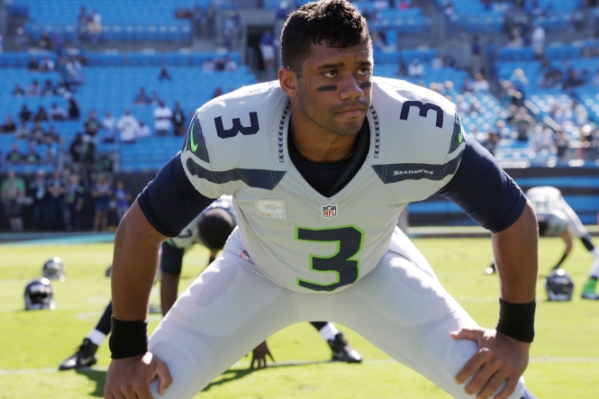- Home
- News
- Opinion
- Entertainment
- Classified
- About Us
 MLK Breakfast
MLK Breakfast- Community
- Foundation
- Obituaries
- Donate
04-25-2024 10:50 am • PDX and SEA Weather

Seattle Seahawks quarterback Russell Wilson (3) warms up before the first half of an NFL football game against the Carolina Panthers, Sunday, Oct. 26, 2014, in Charlotte. (AP Photo/Bob Leverone)
The Black Athlete
In early October, Seattle Seahawks Super Bowl winning quarterback, Russell Wilson, published a revealing article on ThePlayersTribune.com, where he discussed his years of being a bully in grade school. Wilson realized that it would be beneficial to tarnish his squeaky-clean image so more fans and players alike could relate to him. But now it’s been reported that unnamed “sources” within the Seahawks locker room claim some players don’t consider Wilson “black enough,” while being too close to the team’s upper management.
It seems like just yesterday when 2nd-term African-American President, Barack Obama, was questioned about not being “black enough” while running for the presidency in 2008. Former Miami Dolphins lineman, Jonathan Martin, was deemed not “black enough” by his African-American teammates a year ago, when being bullied and called the N-word by white veteran player, Richie Incognito. A year before that, Washington’s popular Heisman Trophy winner, Robert Griffin III, was speculated of being a “cornball brother” by African-American sportswriter, Rob Parker, who was quoting discussions overheard at his local Detroit barbershops.
The ongoing and bitter history of African-Americans who mistrust, ostracize and bully each other into following certain stereotypical traits, beliefs and concerns of the community has been a long and conflicting battle.
On one hand, certain group decisions are still needed to benefit the race as a whole, in particular on issues of politics that may affect fair education, employment, housing, taxation and the fair practices of American law. But when it comes to individual beliefs, ideas, habits, likes, dislikes and behaviors, all bets are off. Each person should have a God-given right and license to be who they are.
Restriction on individualism is where the problems lie. There have been far too many disputes about how someone looks, walks, talks, dresses, who they hang out with, what music they listen to, and who they marry.
I participated in such race bullying in my college years, where certain small town kids were teased for being less than urban cool. When you’re born and raised in the strong cultured big cities of Philadelphia, New York, Washington DC, Chicago, Detroit, and so on, you tend to set a higher bar of what black is supposed to be. Everything else becomes “country,” “corny,” “backwards,” “bama” and “not black enough.”
 PHOTO: Seattle Seahawks quarterback Russell Wilson (3) works against the Carolina Panthers during the first half of an NFL football game, Sunday, Oct. 26, 2014, in Charlotte. (AP Photo/Mike McCarn)
PHOTO: Seattle Seahawks quarterback Russell Wilson (3) works against the Carolina Panthers during the first half of an NFL football game, Sunday, Oct. 26, 2014, in Charlotte. (AP Photo/Mike McCarn)
However, the most harmful type of black-on-black bullying is when we accuse someone of “acting white,” “selling out” or being an “oreo.” Without realizing the many societal implications involved, “acting white” becomes a label for African-Americans who have higher academic standards, speak correct English, read books, live in higher economic neighbors, are successful at their goals, and are accepted and sociable with white American peers.
Wow, that sounds like Russell Wilson. But the problem is, if all of that is “acting white” and not being “black enough,” then what is “acting black” and being “real”—having low academic standards, speaking broken English, never reading anything, living in poverty, never reaching your goals, and not being accepted or sociable with white America?
Think about it. What exactly are we saying when we quantify the words “black” and “white?” Because the last time I checked the dictionary, everything “white” is deemed fresh, clean, innocent, angelic, perfect, ideal, good, honest, bright, new, beginning, exact and unmarked. In contrast, “black” is labeled soiled, dark, evil, deadly, mysterious, deceptive, violent, secretive, demonic, tragic and the end of things.
Ironically, the color “black” is also identified with power and elegance, like Black Power and black-tie affairs. However, that’s not the identification of the word “black” that African-Americans are referring to when they claim that someone isn’t “black enough,” I assure you. The question is, what do they mean by the term? I’ve never used it, because I understand that they are degrees to everything. And your “not black enough” may be someone else’s “too black.”
Like the use of the N-word that sports media professionals argued about last year, the African-American term “not black enough” will continue to be argued about as well. Nevertheless, one has to wonder if the Seattle Seahawks were a dominate 6-0 or 5-1 instead of a struggling 4-3, whether Russell Wilson’s degree of blackness would have ever become an issue.
Hence, losing and complaining about your teammates becomes a “black thing,” while winning and loving your guys is all right and “white.” Think about it.
Omar Tyree is a New York Times bestselling author, an NAACP Image Award winner for Outstanding Fiction and a professional journalist @ www.OmarTyree.com